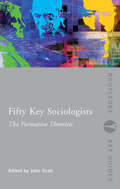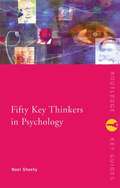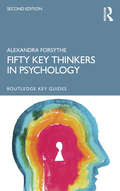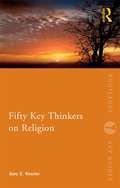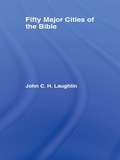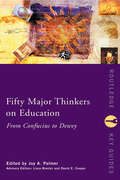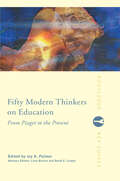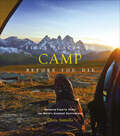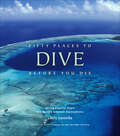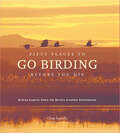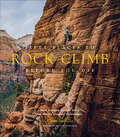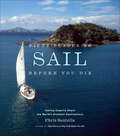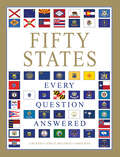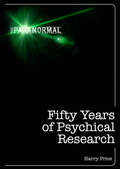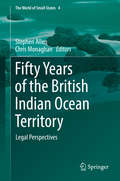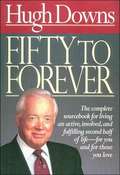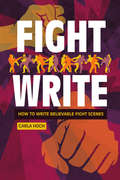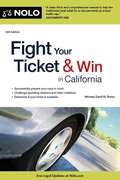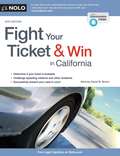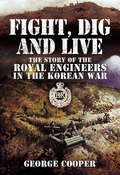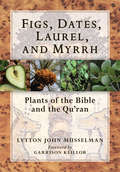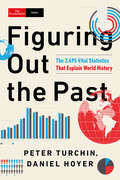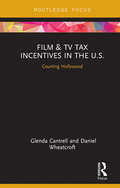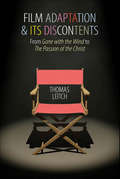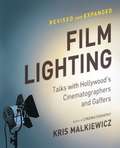- Table View
- List View
Fifty Key Sociologists: The Formative Theorists (Routledge Key Guides)
by John ScottCovering the life, work, ideas and impact of some of the most significant thinkers in sociology, Fifty Key Sociologists: The Formative Theorists concentrates on figures in the field writing principally in the nineteenth and early twentieth centuries. Including entries on Jane Addams, Theodor Adorno, George Lukács, Max Weber and Pitrim Sorokin, this practical text: is presented in an accessible A–Z format for maximum ease-of-use provides full cross-referencing and a further reading section for each entry, in order to allow the reader to broaden their understanding of the area includes biographical data for each of the figures covered. Presenting the key works and ideas of each sociologist featured, as well as providing some critical assessment of their work, this is an ideal reference guide for undergraduate and postgraduate students of sociology, cultural studies and general studies, as well as other readers interested in this important field.
Fifty Key Thinkers in Psychology (Routledge Key Guides)
by Noel Sheehy Alexandra ForsytheFifty Key Thinkers in Psychology introduces the life, thought and work of some of the most influential figures who have shaped and developed modern psychology. It features accessibly written and fully cross-referenced entries on such figures as: Sigmund Freud, Noam Chomsky, Carl Jung, Ivan Pavlov, Jean Piaget, Anne Anastasi, Konrad Lorenz, Hans Eysenck and William James. This fascinating and informative guide is an invaluable resource for those studying, working in, or who simply want to find out more about psychology.
Fifty Key Thinkers in Psychology (Routledge Key Guides)
by Alexandra ForsytheThe new edition of Fifty Key Thinkers in Psychology introduces the life, thought, work and impact of some of the most influential figures who have shaped and developed modern psychology, considering a more diverse history of the discipline. The revised text includes new biographies, histories, and overviews of the work from scientists and scholars such as Alfred Alder, Isabel Briggs Myers, Katherine Cook Briggs and Karen Horney, as well as major re-writes of the works of Freud, Binet and Jung, and some of the more controversial characters such as Charles Galton and Hans Eysenck. Exploring the often overlooked but significant contributions of black, Jewish, and Eastern scholars to the discipline, this new edition looks to address the historically imbalanced focus of particular key thinkers and begin unpicking the impact that race and gender had on the direction and advancement of the field. The book covers the black psychology movement from George Herman Candy to Mamie Phipps Clark, and Kenneth Bancroft Clark, the enormous contribution of Chinese psychologist Jing Qicheng, and some of the many great psychologists whose families were part of the waves of Jewish emigration to the United States escaping oppression, persecution and economic hardship, including Walter Mischel, Cary Cooper and Daniel Kahneman. This fascinating and informative guide is an invaluable resource for those studying, working in, or who simply want to find out more about psychology, suitable for both students and the lay reader alike.
Fifty Key Thinkers on Religion (Routledge Key Guides)
by Gary KesslerFifty Key Thinkers on Religion is an accessible guide to the most important and widely studied theorists on religion of the last 300 years. Arranged chronologically, the book explores the lives, works and ideas of key writers across a truly interdisciplinary range, from sociologists to psychologists. Thinkers covered include: Friedrich Nietzsche James Frazer Sigmund Freud Emile Durkheim Ludwig Wittgenstein Mary Douglas Talal Asad Søren Kierkegaard Providing an indispensable one volume map of our understanding of religion in the west, the book is fully cross-referenced throughout and provides authoritative guides to important primary and secondary texts for students wishing to take their studies further.
Fifty Major Cities of the Bible (Routledge Key Guides)
by John LaughlinFrom the ruins of the ancient seaside city of Acco, to the small but archaeologically important town of Yokneam, Fifty Major Cities of the Bible provides readers with a comprehensive guide to the ancient cities that played a vital role in the world from which the Bible originated. Not only covering renowned cities such as Jerusalem and Jericho, the book also includes lesser known towns like Aroer, Beth-Zur and Gibeah, which have all provided their own valuable contributions to the way in which we now understand the biblical world. A fascinating, easy-to-follow text, key features include: * the biblical context of each city or town * a summary of its known archeological history * non-biblical references to the site * photographs and illustrations * a concise bibliography for further reading Also provided is a handy reference map to the major archaeological sites in Israel, as well as chronological tables for easy reference. Concise, informative and high accessible, Fifty Major Cities of the Bible is a superb overview of the cities and towns that made up the Biblical world, and an essential resource for students and enthusiasts.
Fifty Major Thinkers on Education: From Confucius to Dewey (Routledge Key Guides)
by David E. Cooper Joy A. Palmer Liora BreslerIn this unique work some of today's greatest educators present concise, accessible summaries of the great educators of the past. Covering a time-span from 500 BC to the early twentieth century each essay gives key biographical information, an outline of the individual's principal achievements and activities, an assessment of their impact and influence, a list of their major writings and suggested further reading. Together with Fifty Modern Thinkers on Education, this book provides a unique reference guide for all students of education.
Fifty Modern Thinkers on Education: From Piaget to the Present Day (Routledge Key Guides)
by Joy A. PalmerFifty Modern Thinkers on Education looks at fifty of the twentieth century's most significant contributors to the debate on education. Among those included are:* Pierre Bourdieu* Elliot Eisner* Hans J. Eysenck* Michel Focault* Henry Giroux* Jurgen Habermas* Susan Isaacs* A.S. Neill* Herbert Read* Simone Weill.Together with Fifty Major Thinkers on Educationthis book provides a unique history of educational thinking. Each essay gives key biographical information, an outline of the individual's principal achievements and activities, an assessment of his or her impact and influence and a list of their major writings and suggested further reading.
Fifty Places to Camp Before You Die: Camping Experts Share the World's Greatest Destinations (Fifty Places)
by Chris SantellaExplore the world&’s top spots for sleeping under the stars—includes beautiful photos, travel tips, and more! The book features the best destinations for exploring the great outdoors and enjoying the recreational activities that make camping such a time-honored tradition—whether your preference is roughing it in nature or enjoying a campground with all the amenities, a solo hike or a family gathering around the fire. Featuring favorite US National Parks destinations—as well as more exotic locales in Italy, Chile, France, Botswana, Thailand, Germany, and more—Fifty Places to Camp Before You Die provides photographs, helpful if-you-go information, the history behind each site, and tips useful to novice and seasoned campers alike. &“Showcases some of the world&’s most beautiful campsites.&” —The New York Times
Fifty Places to Dive Before You Die: Diving Experts Share the World's Greatest Destinations (Fifty Places)
by Chris SantellaSCUBA in Cuba? Find seashells in the Seychelles? Discover the must-dive destinations recommended by the experts—includes beautiful underwater photos. The earth&’s oceans hold many wondrous surprises—be they the small, colorful critters off the coast of Papua New Guinea, opportunistic red demon squids in the Sea of Cortes, or naval wrecks in the lagoon of Bikini Atoll. In Fifty Places to Dive Before You Die, Chris Santella has invited diving experts from around the world to share some of their favorite destinations, so ardent divers can experience these underwater wonders for themselves—either on location in their SCUBA gear, or at home in their armchair. Part of the bestselling Fifty Places series, the book takes divers from hot-spot destinations like Raja Ampat (off the coast of West Guinea) to old Caribbean favorites like Grand Cayman. Swim among whale sharks off Myanmar, befriend wolf eels off the coast of Maine, and marvel at the giant mola mola of Lembognan, Indonesia. These wonderful creatures—plus the brilliant coral reefs that often provide their backdrop—are captured in forty gorgeous color photos from the world&’s greatest underwater photographers. And for those who want to travel to these breathtaking locales, Santella provides complete &“If You Go&” suggestions to help you plan your trip.
Fifty Places to Go Birding Before You Die: Birding Experts Share the World's Geatest Destinations (Fifty Places)
by Chris SantellaIt’s estimated that 50 to 60 million Americans count birding among their hobbies. Some hang feeders in their backyards and accumulate yard lists; others participate in annual “Christmas Counts”; a select few travel to the ends of the earth in an effort to see every bird in the world. With Fifty Places to Go Birding Before You Die, Chris Santella takes the best-selling “Fifty Places” recipe and applies it to this most popular pastime. Santella presents some of the greatest bird-watching venues in the United States and abroad through interviews with prominent birders, from tour leaders and conservationists to ornithologists and academics. Interviewees include ornithologist Kenn Kaufman; David Allen Sibley, author and illustrator of The Sibley Guide to Birds; Rose Ann Rowlett, the “mother of modern birding”; John Fitzpatrick, director of the Cornell Lab of Ornithology; and Steve McCormick, president and CEO of The Nature Conservancy. The places vary from the urban (New York City’s Central Park) to the mystical (the cloud forests of Triunfo in Chiapas, Mexico) to the extremely remote (the sub-Arctic islands of New Zealand). The book includes 40 gorgeous photographs that capture the vibrancy of our feathered friends, and the beautiful places they call home.
Fifty Places to Rock Climb Before You Die: Rock Climbing Experts Share the World's Greatest Destinations (Fifty Places)
by Chris SantellaA guide to some of the greatest locations around the world as recommended by expert rock climbers, with travel tips and stunning photos included. Covering three types of climbing—trad, sport, and bouldering—and showcasing breathtaking venues from Joshua Tree to Jeju, South Korea, this guide features insights from industry insiders, including employees from rock-climbing gear companies like Petzl and Black Diamond Equipment, professional climbers like Jon Cardwell and Kevin Jorgeson (co-star of Dawn Wall), filmmaker Michael Call, and Climbing magazine editor Matt Samet. And for those who want to travel to these locales, Chris Santella provides &“If You Go&” suggestions to help plan your trip. This essential travel companion for climbers of all levels of expertise features such locations as: Horse Pens 40, Alabama * Cochise Stronghold, Arizona * Black Canyon of the Gunnison National Park, Colorado * Innsbruck, Austria * Castle Hill, New Zealand * Elephant&’s Perch, Idaho * The Bugaboos, British Columbia * Arco, Italy * Red River Gorge, Kentucky * Devil&’s Lake, Wisconsin * Acadia National Park, Maine * The Shawangunks, New York * Wichita Mountains Wildlife Refuge, Oklahoma * Chamonix, France * Railay Beach, Thailand * and more
Fifty Places to Sail Before You Die: Sailing Experts Share the World's Greatest Destinations (Fifty Places)
by Chris SantellaChampionship racers and professional adventurers disclose their favorite destinations in an inspiring volume of stories, travel tips, and photos. Featuring some of the best-known men and women in the sport—Tom Whidden and Gary Jobson (members of the winning 1987 America&’s Cup crew), Jeff Johnstone (of J-Boats), award-winning sailing writer Lin Pardey, and many others—this is a unique full-color celebration for sailors to relive their greatest memories or plan their next big adventure. The amazingly diverse places they&’ve selected include: Australia: Fremantle and Sydney Bermuda: St. George&’s Harbor Brazil: Bay of Ilha Grande California: Channel Islands and San Francisco Bay Chile: Cape Horn Italy: Costa Smeralda, Sardinia Maine: Boothbay Harbor, Penobscot Bay, Southwest Harbor Florida: Biscayne Bay and Key West Scotland: Firth of Clyde South Africa: Cape Town…and dozens more For each place, the sailor recommending the venue spins an entertaining yarn about their experience there, and each description is accompanied by a &“make you want to go there now&” photograph. From the relative indolence of cruising the Dodecanese or the British Virgin Islands, to the white-knuckle adventure of rounding Cape Horn, to the thrill of partaking in the regatta off Newport, Fifty Places to Sail Before You Die captures the rich and varied world of recreational sailing—and may just inspire you to set sail on some new adventures of your own.
Fifty States: Every Question Answered
by Marcel Brousseau Amber Rose Lori BairdTake a tour of America with this outstanding reference—including photos, maps, and extensive facts about each state&’s geography, history—and more. What was the last state to join the Union? What does the state quarter for Alabama look like? What is the state bird of Texas? How did Vermont get its name? All the answers are contained in Fifty States: Every Question Answered! Whether you&’re a student or just a history buff, this book is a great reference manual to each state&’s geography, history, factual details, and ecology. Beautiful color photos and maps also provide a view of how the landscape has changed over the years. Young and old alike will enjoy this adventurous, wide-ranging walk through the United States of America.
Fifty Years of Psychical Research: A Critical Survey (The Paranormal)
by Harry Price1939. A critical survey. Contents: phenomena investigated; beginnings of organized research, the story of the S. P. R. ; a fit subject of university study and research; fifty years of psychical phenomena; the Schneider Boys; Margery; Stella C. ; Rosalie; miracles of the mind, some famous mental mediums; story of E. S. P. ; mechanics of spiritualism; law and the medium; scientific method of psychical research; science solves the fire walk mystery; broadcasting the occult; books that have made history; I believe.
Fifty Years of the British Indian Ocean Territory: Legal Perspectives (The World of Small States #4)
by Stephen Allen Chris MonaghanThis book offers a detailed account of the legal issues concerning the British Indian Ocean Territory (Chagos Islands) by leading experts in the field. It examines the broader significance of the ongoing Bancoult litigation in the UK Courts, the Chagos Islanders' petition to the European Court of Human Rights and Mauritius' successful challenge, under the UN Convention of the Law of the Sea, to the UK government's creation of a Marine Protected Area around the Chagos Archipelago. This book, produced in response to the 50th anniversary of the BIOT's founding, also assesses the impact of the decisions taken in respect of the Territory against a wider background of decolonization while addressing important questions about the lawfulness of maintaining Overseas Territories in the post-colonial era.The chapter ‘Anachronistic As Colonial Remnants May Be...’ - Locating the Rights of the Chagos Islanders As A Case Study of the Operation of Human Rights Law in Colonial Territories is open access under a CC BY 4.0 license via link.springer.com.
Fifty to Forever
by Hugh DownsHugh Downs, a man who has thoroughly researched issues affecting older adults, has good news for everyone entering the 50-plus generation. The news, as Downs relates in this uplifting, fact-filled volume, is that older adults now have more choices than ever before when they consider how they want to live, work, and play in the years to come. What's the catch? Just one: understanding that with the multitude of choices come the responsibilities of research and decision making. But rest easy--with this book, Hugh Downs has done most of the homework for us. What's left is the decision making. From health care to the selection of living arrangements, Fifty to Forever gives older adults the background they need to make their choices with confidence.
Fight Write: How to Write Believable Fight Scenes
by Carla HochWhether a side-street skirmish or an all-out war, fight scenes bring action to the pages of every kind of fiction. But a poorly done or unbelievable fight scene can ruin a great book in an instant. In Fight Write you'll learn practical tips, terminology, and the science behind crafting realistic fight scenes for your fiction. Broken up into "Rounds," trained fighter and writer Carla Hoch guides you through the many factors you'll need to consider when developing battles and brawls.In Round 1, you will consider how the Who, When, Where, and Why questions affect what type of fight scene you want to craft.Round 2 delves into the human factors of biology (think fight or flight and adrenaline) and psychology (aggression and response to injuring or killing another person).Round 3 explores different fighting styles that are appropriate for different situations: How would a character fight from a prone position versus being attacked in the street? What is the vocabulary used to describe these styles?Round 4 considers weaponry and will guide you to select the best weapon for your characters, including nontraditional weapons of opportunity, while also thinking about the nitty-gritty details of using them.In Round 5, you'll learn how to accurately describe realistic injuries sustained from the fights and certain weapons, and what kind of injuries will kill a character or render them unable to fight further.By taking into account where your character is in the world, when in history the fight is happening, what the character's motivation for fighting is, and much more, you'll be able write fight scenes unique to your plot and characters, all while satisfying your reader's discerning eye.
Fight Your Ticket & Win in California
by David BrownWin your traffic court case with the book that's helped thousands of Californians! A traffic conviction can add hundreds of dollars to your yearly auto insurance premiums. Fight Your Ticket & Win in California shows you how to handle your case in traffic court, get the right kind of hearing and win. Attorney David Brown provides you with the detailed tactics you need to: prepare and present your evidence argue before a judge cross-examine a police officer's testimony get your case dismissed appeal a decision determine the consequences of your violation The 14th edition provides the latest legal information for California drivers, including fines and penalties, and contains fully up-to-date information on recently signed legislation regarding cell phone use.
Fight Your Ticket & Win in California
by David W. BrownA traffic conviction can add hundreds of dollars to your yearly auto insurance premiums. Fight Your Ticket & Win in California shows you how to handle your case in traffic court, get the right kind of hearing and win. Attorney David Brown provides you with the detailed tactics you need to: . prepare and present your evidence . argue before a judge . cross examine a police officer's testimony . get your case dismissed . appeal a decision . determine the consequences of your violation This edition provides the latest legal information for California drivers, including fines and penalties, and contains fully up to date information on recently signed legislation regarding cell phone use. Check out Nolo's list of California products. Not a California resident? Check out Beat Your Ticket.
Fight, Dig and Live: The Story of the Royal Engineers in the Korean War
by George CooperThe Korean War, which began with an unprovoked attack by North Korea in 1950, went on for three long years. Over 100,000 soldiers of the United Nations forces, including those of the Republic of Korea, were killed and three times that number wounded. United Kingdom casualties amounted to some 300 Officers and 4,000 Other Ranks. The Royal Engineers deployed a Field Squadron to Korea in the Autumn of 1950 and this was expanded to a Regiment the following year. Involved in fierce fighting, the Sappers suffered grievous casualties including 42 killed and several hundred wounded. Their gallantry was rewarded by numerous gallantry awards, including two DSOs, thirteen MCs, (one by the author), eight MMs and the most distinguished of all, a Distinguished Conduct Medal, second only to the Victoria Cross.It was a vicious war whose intensity never slackened and in the last two months alone the Communist artillery fired over 700,000 rounds against 4.7 million fired back by the United Nations. The Royal Engineers were involved at all levels, from patrols and minefields, to defense works and, providing support to all manner of operations such as transportation, bridging and the important provision of postal services, so vital for morale. Inevitably, though, the focus in that of a war like Korea is often on sapper participation in the forward area where they were often involved in close-quarter fighting with the enemy. Sappers certainly lived up to the title of this book: Fight, Dig and Live.
Figs, Dates, Laurel, and Myrrh: Plants of the Bible and the Quran
by Garrison Keillor Lytton John MusselmanThis book celebrates the plants of the Old Testament and New Testament, including the Apocrypha, and of the Quran. From acacia, the wood of the tabernacle, to wormwood, whose bitter leaves cured intestinal worms, 81 fascinating chapters—covering every plant that has a true botanical counterpart—tell the stories of the fruits and grains, grasses and trees, flowers and fragrances of ancient lore. The descriptions include the plants' botanical characteristics, habitat, uses, and literary context. With evocative quotations and revelatory interpretations, this information is all the more critical today as the traditional agrarian societies that knew the plants intimately become urbanized.The unusually broad geographic range of this volume extends beyond Israel to encompass the Holy Land's biblical neighbors from southern Turkey to central Sudan and from Cyprus to the Iraq border.Richly illustrated with extensive color photography and with a foreword by the incomparable Garrison Keillor, this delightful ecumenical botany offers the welcome tonic of a deep look into an enduring, shared natural heritage.
Figuring Out the Past: The 3,495 Vital Statistics that Explain World History
by Peter Turchin Daniel HoyerWhat was history's biggest empire? Or the tallest building of the ancient world? What was the plumbing like in medieval Byzantium? The average wage in the Mughal Empire? Where did scientific writing first emerge? What was the bloodiest ever ritual human sacrifice?We are used to thinking about history in terms of stories. Yet we understand our own world through data: cast arrays of statistics that reveal the workings of our societies. In Figuring Out the Past, radical historians Peter Turchin and Dan Hoyer dive into the numbers that reveal the true shape of the past, drawing on their own Seshat project, a staggeringly ambitious attempt to log every data point that can be gathered for every society that has ever existed. This book does more than tell the story of humanity: it shows you the big picture, by the numbers.
Film & TV Tax Incentives in the U.S.: Courting Hollywood (Routledge Studies in Media Theory and Practice)
by Glenda Cantrell Daniel WheatcroftEntertainment tax incentives are one of the greatest tools in the arsenal of filmmaking. They pay a portion of production expenditures back to the filmmaker, while creating powerful economic engines for the states who implement them properly. They are high in the list of considerations for executives to sign off before a movie receives the go-ahead for production, even to the point of dictating the location of where a production is filmed. Yet, they are misunderstood by the filmmakers who use them, the politicians who create them, the economists who measure them, and even the scholars who study them. This book puts all the pieces together in a comprehensive look at how the entertainment industry works, how it uses incentives, and how incentives can benefit a filmmaker – or a state.
Film Adaptation and Its Discontents: From Gone with the Wind to The Passion of the Christ
by Thomas LeitchMost books on film adaptation—the relation between films and their literary sources—focus on a series of close one-to-one comparisons between specific films and canonical novels. This volume identifies and investigates a far wider array of problems posed by the process of adaptation. Beginning with an examination of why adaptation study has so often supported the institution of literature rather than fostering the practice of literacy, Thomas Leitch considers how the creators of short silent films attempted to give them the weight of literature, what sorts of fidelity are possible in an adaptation of sacred scripture, what it means for an adaptation to pose as an introduction to, rather than a transcription of, a literary classic, and why and how some films have sought impossibly close fidelity to their sources. After examining the surprisingly divergent fidelity claims made by three different kinds of canonical adaptations, Leitch's analysis moves beyond literary sources to consider why a small number of adapters have risen to the status of auteurs and how illustrated books, comic strips, video games, and true stories have been adapted to the screen. The range of films studied, from silent Shakespeare to Sherlock Holmes to The Lord of the Rings, is as broad as the problems that come under review.
Film Lighting: Talks with Hollywood's Cinematographers and Gaffer
by Kris MalkiewiczNewly revised and updated, Film Lighting is an indispensible sourcebook for the aspiring and practicing cinematographer, based on extensive interviews with leading cinematographers and gaffers in the film industry.Film lighting is a living, dynamic art influenced by new technologies and the changing styles of leading cinematographers. A combination of state-of-the-art technology and in-depth interviews with industry experts, Film Lighting provides an inside look at how cinematographers and film directors establish the visual concept of the film and use the lighting to create a certain atmosphere.Kris Malkiewicz uses firsthand material from the experts he interviewed while researching this book. Among these are leading cinematographers Dion Beebe, Russell Carpenter, Caleb Deschanel, Robert Elswit, Mauro Fiore, Adam Holender, Janusz Kaminski, Matthew Libatique, Rodrigo Prieto, Harris Savides, Dante Spinotti, and Vilmos Zsigmond. This updated version of Film Lighting fills a growing need in the industry and will be a perennial, invaluable resource.
